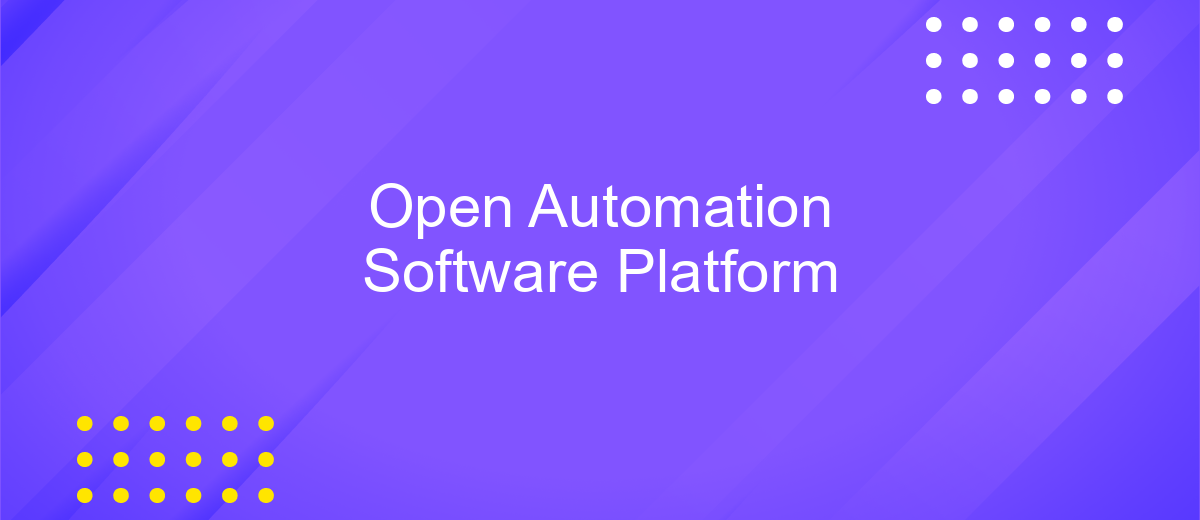Open Automation Software Platform
The Open Automation Software Platform is revolutionizing the way industries approach automation by providing a flexible, scalable, and user-friendly solution. Designed to seamlessly integrate with existing systems, this platform empowers businesses to enhance productivity, reduce operational costs, and improve efficiency. By leveraging cutting-edge technologies, it offers real-time data processing and analytics, enabling informed decision-making and streamlined operations across various sectors. Discover the future of automation with this innovative platform.
Introduction
The Open Automation Software Platform represents a significant advancement in the realm of industrial automation, providing a versatile solution for seamless integration and control of various systems. By leveraging cutting-edge technology, this platform facilitates efficient data management and real-time communication across diverse industrial environments. Its open architecture allows for customization and scalability, catering to the unique needs of different industries.
- Seamless integration with existing systems
- Real-time data processing and analytics
- Scalable and customizable architecture
- Enhanced security features
- Support for a wide range of industrial protocols
As industries continue to evolve, the demand for more flexible and efficient automation solutions grows. The Open Automation Software Platform addresses these needs by offering a robust framework that supports innovation and adaptability. By enabling seamless connectivity and comprehensive data analysis, it empowers businesses to optimize operations, reduce costs, and improve decision-making processes. This platform stands as a cornerstone for the future of industrial automation, driving progress and efficiency in an ever-changing technological landscape.
Features and Benefits

The Open Automation Software Platform offers a robust suite of features designed to streamline and enhance automation processes across diverse industrial environments. With its user-friendly interface, the platform supports seamless integration with various systems, ensuring that data flows effortlessly between devices and applications. This flexibility allows businesses to customize their automation solutions to meet specific operational needs, resulting in improved efficiency and reduced downtime. The platform's scalability ensures that it can grow with your business, adapting to increased demands and evolving technological landscapes.
One of the standout benefits of the platform is its compatibility with leading integration services like ApiX-Drive. This integration capability enables users to connect different applications and automate workflows without extensive coding knowledge. By leveraging ApiX-Drive, businesses can easily configure integrations, facilitating real-time data exchange and process automation. This not only saves time but also minimizes the risk of human error, allowing teams to focus on more strategic tasks. Overall, the Open Automation Software Platform empowers companies to optimize operations, enhance productivity, and achieve greater competitive advantage in their industry.
Use Cases

The Open Automation Software Platform is a versatile solution designed to streamline processes across various industries. By integrating diverse systems, it enhances operational efficiency and provides real-time data insights. This platform is particularly beneficial for businesses seeking to optimize their automation strategies and improve productivity.
- Manufacturing: Automate production lines, monitor equipment status, and predict maintenance needs to minimize downtime.
- Energy Management: Optimize energy consumption and integrate renewable energy sources for sustainable operations.
- Smart Buildings: Control lighting, HVAC, and security systems to enhance comfort and reduce energy costs.
- Transportation: Coordinate logistics, track vehicle locations, and improve fleet management efficiency.
- Healthcare: Streamline patient management, monitor medical devices, and enhance data security for better patient outcomes.
By implementing the Open Automation Software Platform, organizations can achieve seamless integration across their technological infrastructure. This leads to improved decision-making capabilities and a reduction in operational costs. As industries continue to evolve, the platform's adaptability ensures it remains a valuable asset in addressing future challenges and opportunities.
Implementation

Implementing the Open Automation Software Platform requires a strategic approach to ensure seamless integration and optimal performance. Begin by assessing your current infrastructure, identifying areas where automation can enhance efficiency and reduce manual intervention. Collaborate with stakeholders to define clear objectives and establish a timeline for implementation.
Next, prepare your team by providing comprehensive training on the platform's features and functionalities. This will empower them to utilize the software effectively and maximize its potential. Additionally, ensure that your IT department is equipped to handle any technical challenges that may arise during the transition.
- Conduct a thorough analysis of existing systems and processes.
- Develop a detailed implementation plan with milestones.
- Engage with a certified implementation partner if necessary.
- Test the platform in a controlled environment before full deployment.
Upon successful implementation, continuously monitor the system's performance and gather feedback from users. This will help in identifying areas for improvement and ensuring the platform evolves with your organization's needs. Regular updates and maintenance are crucial to maintaining the efficiency and reliability of the Open Automation Software Platform.


Conclusion
The Open Automation Software Platform represents a significant advancement in the field of automation, offering a versatile and robust framework for seamless integration across various systems and processes. Its ability to streamline operations and enhance efficiency is unparalleled, making it a valuable asset for businesses aiming to optimize their workflows. By leveraging the platform's capabilities, organizations can achieve greater scalability and adaptability, ensuring they remain competitive in a rapidly evolving technological landscape.
Furthermore, the integration solutions provided by services like ApiX-Drive complement the Open Automation Software Platform by simplifying the process of connecting disparate systems. ApiX-Drive's user-friendly interface and comprehensive support for various applications enable businesses to effortlessly automate data transfers and synchronize workflows. This synergy between the Open Automation Software Platform and integration services like ApiX-Drive empowers organizations to maximize their operational potential, reduce manual intervention, and focus on strategic growth initiatives. As a result, the adoption of such innovative technologies is poised to drive substantial improvements in productivity and resource management across industries.
FAQ
What is an Open Automation Software Platform?
How can an Open Automation Software Platform improve business processes?
What are the key features of an Open Automation Software Platform?
How does an Open Automation Software Platform handle integrations with other software?
Is technical expertise required to use an Open Automation Software Platform?
Time is the most valuable resource for business today. Almost half of it is wasted on routine tasks. Your employees are constantly forced to perform monotonous tasks that are difficult to classify as important and specialized. You can leave everything as it is by hiring additional employees, or you can automate most of the business processes using the ApiX-Drive online connector to get rid of unnecessary time and money expenses once and for all. The choice is yours!

